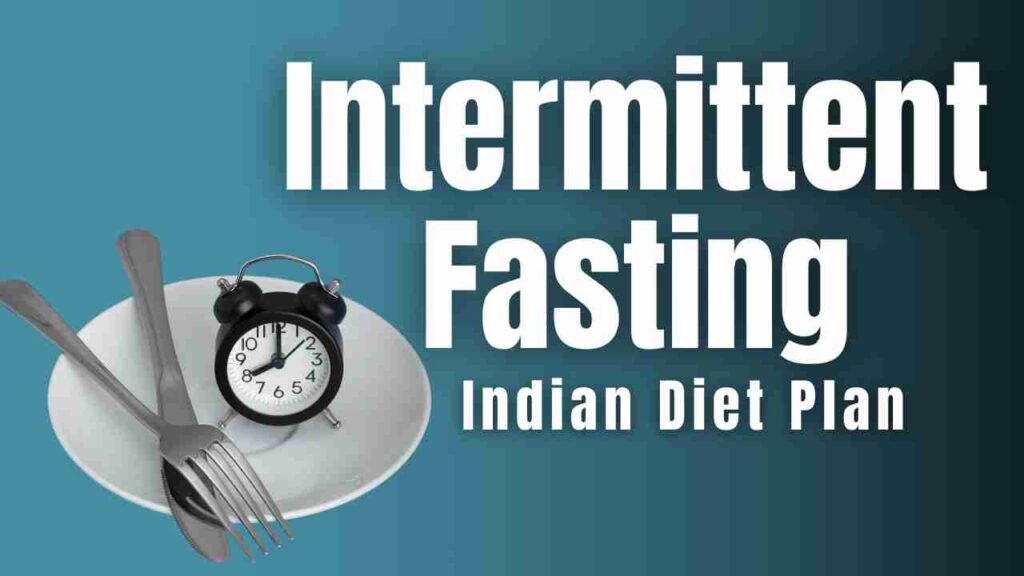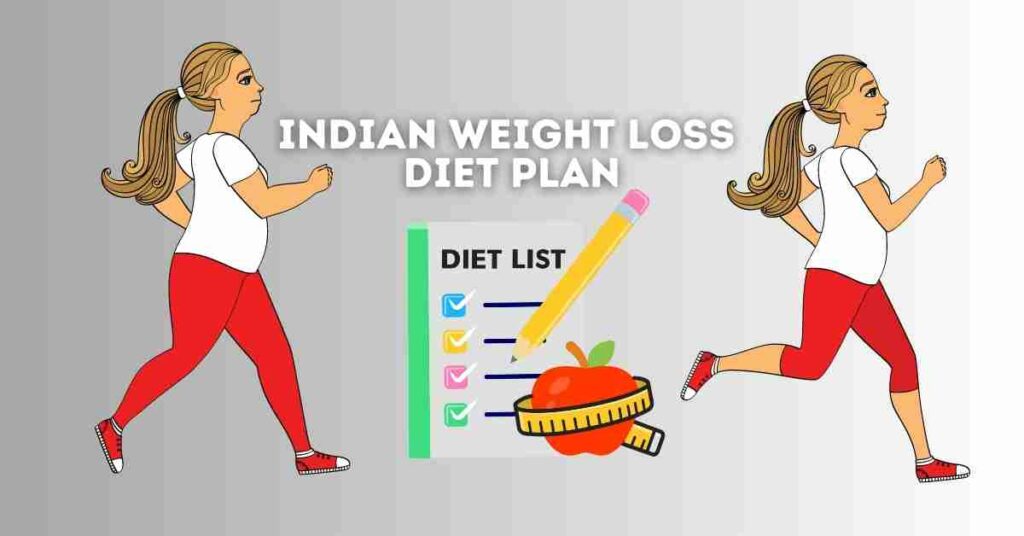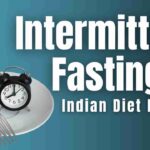Whether you talk about India or any part of the world, fasting has always been integral to the culture. But with modernisation, changing beliefs and the urge to know the logical scientific reason before accepting anything, fasting has become a tool for weight loss and healthy life in terms of Intermittent fasting. Like always, when you talk about a healthy life, managing diet is important, and the same goes for intermittent fasting; therefore, we are here with Intermittent Fasting Diet Plan Indian.

Intermittent fasting is an organised way of eating, which talks about when you eat, not what or how much. Hence, that’s the catch: the foodie Indians do not reframe themselves from food irrespective of the load of calories in the eating window period, because of which we don’t get the benefits of Intermittent fasting to the fullest.
Therefore, it’s important to know the Indian diet plan for intermittent fasting, which is sustainable as well as nutritious and will maximise the benefits of intermittent fasting.
Intermittent fasting rules
Firstly, to begin with intermittent fasting, you should be clear about which type of Intermittent fasting you will follow or which suits you. There are 4 main types of intermittent fasting, i.e., 16:8 intermittent fasting, 12:12 intermittent fasting, Alternate day fasting and 5:2 intermittent fasting, out of which you can choose the best fit.
Popular types of intermittent fasting
Intermittent fasting 16/8:
This involves fasting for 16 hours and eating during an 8-hour window. For instance, you might have your first meal at 12 PM and finish eating by 8 PM.
Intermittent fasting 12/12:
A more relaxed approach involves fasting for 12 hours and eating during a 12-hour window—for instance, dining from 7 AM to 7 PM.
Alternate-Day Fasting:
This method alternates between regular eating and fasting days or consuming very few calories.
5:2 Diet intermittent fasting:
Eat normally for five days and significantly reduce calorie intake (around 500-600 calories) on the next two consecutive days.
Hydration during intermittent Fasting
Whether you are doing fasting or not keeping your body hydrated is key to good health. Hence, how can we miss it during intermittent fasting.
Hydration is crucial during intermittent fasting, especially for weight loss. Even mild dehydration can lead to reduced endurance, increased fatigue, and altered thermoregulation, impacting performance and motivation. Rehydration helps reverse these effects. Children and athletes, especially in hot climates, are at risk of dehydration, impacting cognitive and physical performance. Adequate fluid intake is essential for maintaining optimal cognitive function, mood, and physical well-being during intermittent fasting and exercise.
Best 7 days Intermittent fasting diet plan Indian
Whether you talk about India or any part of the world, fasting has always been…
The Truth About Calorie Counting: Balancing Weight Loss and Mental Health
Calorie counting may appear appealing as a foolproof weight loss strategy, but the “truth about…
Effective Indian Weight Loss Diet Plan
The unique qualities that set humans apart from other creatures on this planet are our…
Balanced Intermittent fasting diet
The research underscores the importance of balanced food choices in intermittent fasting (IF), which includes various strategies like intermittent fasting and time-restricted feeding (TRF). These approaches follow specific intermittent fasting timelines, such as skipping breakfast or dinner, and limiting the daily eating window. Studies reveal that IF and continuous energy restriction (CER) yield comparable weight loss results in adults with overweight or obesity.
To maximize success, individuals must prioritize nutrient-dense foods like whole grains, lean proteins, fruits, vegetables, and healthy fats within their chosen intermittent fasting timetable. These foods provide essential nutrients and fiber, supporting overall health and satiety. Maintaining balanced meals during eating windows is essential to staying aligned with intermittent fasting goals. Conversely, excessive calorie-dense, processed, or sugary foods can impede weight loss progress and overall well-being. Therefore, achieving effective weight loss through intermittent fasting entails not only when you eat but also what you eat for optimal outcomes.
Listen to your body
Listening to your body is essential for maintaining good physical and mental health. It helps you understand your body’s unique signals and needs, promoting overall well-being. By paying attention to hunger cues, fatigue, and emotions, you can make informed decisions about eating, resting, and managing stress. Ignoring your body’s messages can lead to overeating, burnout, or emotional distress. Additionally, tuning in to physical sensations can help you detect potential health issues early, fostering proactive healthcare. Ultimately, listening to your body is a powerful tool for self-care, enabling you to nurture your body, mind, and emotions effectively, leading to a healthier, happier life.
Avoid Excess Sugar and Processed Foods:
Avoiding excess sugar and processed foods is crucial during intermittent fasting for several reasons. These foods tend to be calorie-dense and lack essential nutrients, making it challenging to achieve a calorie deficit for weight loss. Excessive sugar intake can lead to rapid blood sugar spikes and crashes, increasing hunger and potentially derailing fasting efforts. Processed foods often contain unhealthy trans fats and additives that can negatively impact overall health.
Additionally, consuming sugary and processed foods during eating windows can disrupt the metabolic benefits of fasting, such as improved insulin sensitivity and fat utilization. To maximize the benefits of intermittent fasting, it’s essential to prioritize whole, nutrient-dense foods that support weight loss and overall well-being.
Portion control in Intermittent fasting
Monitoring portion sizes is crucial in intermittent fasting to ensure effective weight management and overall health. During fasting periods, it’s essential to consume balanced, nutrient-dense meals to provide essential vitamins, minerals, and sustenance while controlling calorie intake.
Carefully measuring portions helps prevent overeating when breaking the fast, promoting satiety and preventing excessive calorie consumption. Additionally, portion control aids in blood sugar management, preventing energy spikes and crashes. It also supports the body’s ability to switch to fat utilization during fasting, facilitating weight loss. Overall, monitoring portion sizes enhances the benefits of intermittent fasting, making it a sustainable and healthy approach to managing weight and promoting well-being.
8 signs and symptoms of vitamin C deficiency
We’ve all heard about the importance of vitamins and nutrients in maintaining good health. Among…
Signs and Symptoms of Vitamin B12 deficiency
Have you ever wondered if your body might be trying to tell you something important?…
Vitamin E deficiency: Cause, Symptoms, and Treatment
Vitamins have their own unique perks and jobs within our bodies. Today, we’re diving into…
Vitamin D deficiency: Cause, Symptoms, and prevention
Let’s enter the illuminating journey into the world of a truly remarkable vitamin – vitamin…
6 Vegetarian diet for weight loss and muscle gain
Weight loss and muscle gain are sensitive topics for vegetarians since it is thought that…
Proven Health Benefits of Dragon Fruits | Nutrition Meet
Dragon fruit is the latest craze among people, especially fitness freaks who like to eat…
Consult a Professional
Intermittent fasting, while gaining popularity, isn’t a one-size-fits-all solution. People have unique needs and responses. Seeking professional guidance is wise for several reasons. Firstly, health and dietary requirements vary widely, and healthcare providers or dietitians can tailor an intermittent fasting plan to fit specific needs, considering medical conditions, medications, and dietary restrictions. Secondly, intermittent fasting can be challenging, and professionals provide valuable support, helping manage hunger, prevent overeating, and address side effects. Lastly, they monitor progress, making adjustments to ensure safe and effective weight loss, reducing the risk of nutritional deficiencies. Consulting a professional ensures a personalized, sustainable, and health-conscious approach to intermittent fasting.
7 days Intermittent fasting diet Plan Indian
Considering all the above points, you can create a well-crafted intermittent fasting diet Plan. Nevertheless, the sample plan will help you improve your health and weight loss. If you want to know more and want a personalized Intermittent fasting Indian diet plan, you can contact Dt. Sobin Gupta.
Sample diet plan for Intermittent fasting India
This sample diet plan gives the distribution of foods between Breakfast, Lunch, and Dinner and give you a idea of what Indian foods to eat during intermittent fasting. Frequently snacking on high-calorie foods should be avoided; instead, you may snack on fruits, which will be low in calories and give you nutrition.
Monday
- Breakfast : Besan chilla with green tea/black tea
- Lunch : Rice*, dal, Spong guard sabji and 1 boiled egg
- Dinner : Soybean chunk sabji and 2 wheat chapati
Tuesday
- Breakfast : 1 egg Omellete with one chapati and black tea
- Lunch : Rice*, Panner sabji, Spinach* bhaji and salad
- Dinner : 2 Dalia Pancake with coconut chutney/sabji of your choice
Wednesday
- Breakfast : Dalia upma and black tea
- Lunch : Katkhate curry, Rice*, and cabbage sabji
- Dinner : Chicken curry with 2 wheat/millete chapati
Thursday
- Breakfast : Sprout salad and black tea
- Lunch : Soyabean curry, dal, rice*, salad and solkadhi
- Dinner : Cheakpea curry with 2 wheat/millete chapati
Friday
- Breakfast : 2 Idli with chutney and black tea
- Lunch : Fish curry, rice*, salad and solkadhi
- Dinner : Ridge gourd sabji, panner salad and 1 chapati
Saturday
- Breakfast : Moong dal dosa with coconut/mint chutney, black tea
- Lunch : Chickpea chole, rice*, ridge gourd sabji, and salad
- Dinner : 1 egg omellete and masala oats
Sunday
- Breakfast : Sprouts salad and black tea
- Lunch : Chicken curry, rice*, salad and solkadhi
- Dinner : Pointed guard sabji, 2 chapati and salad
Conclusion
To sum up, intermittent fasting is gaining recognition as a viable and effective dietary strategy for weight management and overall health. The Indian intermittent fasting diet plan provides a structured approach to this eating pattern, aligning with cultural preferences and daily routines. It offers flexibility, promotes mindful eating, and can lead to positive health outcomes when followed correctly. However, consulting a healthcare professional or dietitian is advisable before starting any new diet to ensure it aligns with individual needs and health goals.














